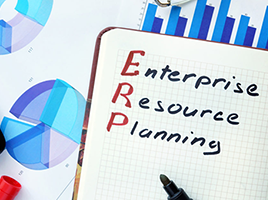We already know the numerous benefits of an ERP system that helps in streamlining business processes. One among the several ERP modules is customer service. While most companies choose to customize their ERP to give a boost to their customer service, some choose to install a separate CRM. In this article, we shall discuss how an ERP can improve customer service.
Today, most of the service modules are available off-the-shelf, mid-scale to large-scale organizations have started to design their own modules. Designing on your own saves you the cost of extensive customization. However, customizing a robust and professionally designed ERP can take you a long way and help you achieve more.
What does it mean for your organization?
Customer service module of ERP has a lot in store for you. It assists you in sales order processing, customer relationship management, physical distribution of goods, billing and invoicing. It empowers the senior management to process sales forecast, orders and plan shipping schedules. Furthermore, it monitors customer buying trends, manages random orders and facilitates key account management.
The features listed below will help you to understand the benefits of ERP for improving customer service.
Features of ERP customer service module:
- Manages both blanket and regular orders
Blanket orders are recurring orders placed by the customer to the supplier that contains multiple delivery dates stretched over a period of time. Such orders are negotiated for predetermined pricing. ERP makes sure that both types of orders are processed simultaneously. - Automated flexible price policies
Your business may require flexible pricing to beat the competition or to offset volatility in the market. Pricing often varies according to time of delivery, size of order and for various other reasons. - APT and CPT capability
APT and CPT capability help you to be transparent with the customer about the exact delivery date during order entry. While APT i.e. Available-to-Promise feature accounts for existing material at hand for both purchased and manufactured items, CTP i.e. Capable-to-Promise features also takes into account inbound purchase receipts, supplier lead items, alternative sourcing option, raw material and labor availability. - Online customer-order and order history
ERP enables your customers to order online. This is especially important when your customers are in crisis and they need instant delivery to replenish their shelf. Online ERP applications help the customers to access your product catalogue, inventory levels and review past order history from anywhere. This reduces the load on your call center and sales force while ensuring outstanding customer service. - EDI processing
Electronic Data Interchange makes sales order processing convenient for your company. Integrated documents like invoice, purchase order acknowledgement and shipment receipt are all automated via EDI. In addition, it helps you to get rid of manual data entry. Built-in features help you to monitor duplicate purchase orders and price verification reducing data errors. - Credit limit management with on-line checking
It is crucial to manage credit limit of your customers especially when there are many customers. There are many parameters that are used to block the order of the customers in case their credit limit is overrun. They include single order value, total value of orders to be fulfilled, turnover yet to be collected and total credit limit.
Total credit limit is inclusive of orders not delivered, delivery notes not invoiced and invoices not collected. You can set an action for each parameter to block the order document and the same can be unblocked when the criteria is fulfilled. And customers can easily check their credit limit account by logging in to your ERP portal.
Capital inflow is essential to maintain work flow. Credit limit management ensures that your priority customers don’t have to bear the brunt due to non-payment by other customers.
Conclusion
Customer service is more than how you treat the customer in direct interactions at the point of sale. Customer service is also delivering a quality product, at a fair price and delivering it when it is promised. Modern Enterprise Resource Planning (ERP) systems are designed to help improve customer service in those key areas.
Companies usually implement new business systems for internal reasons, mainly the reason being improving profitability. What is also true is that by increasing the quality of the products, reducing costs and increasing delivery reliability they also improve customer service. Modern ERP systems help improve customer service.







